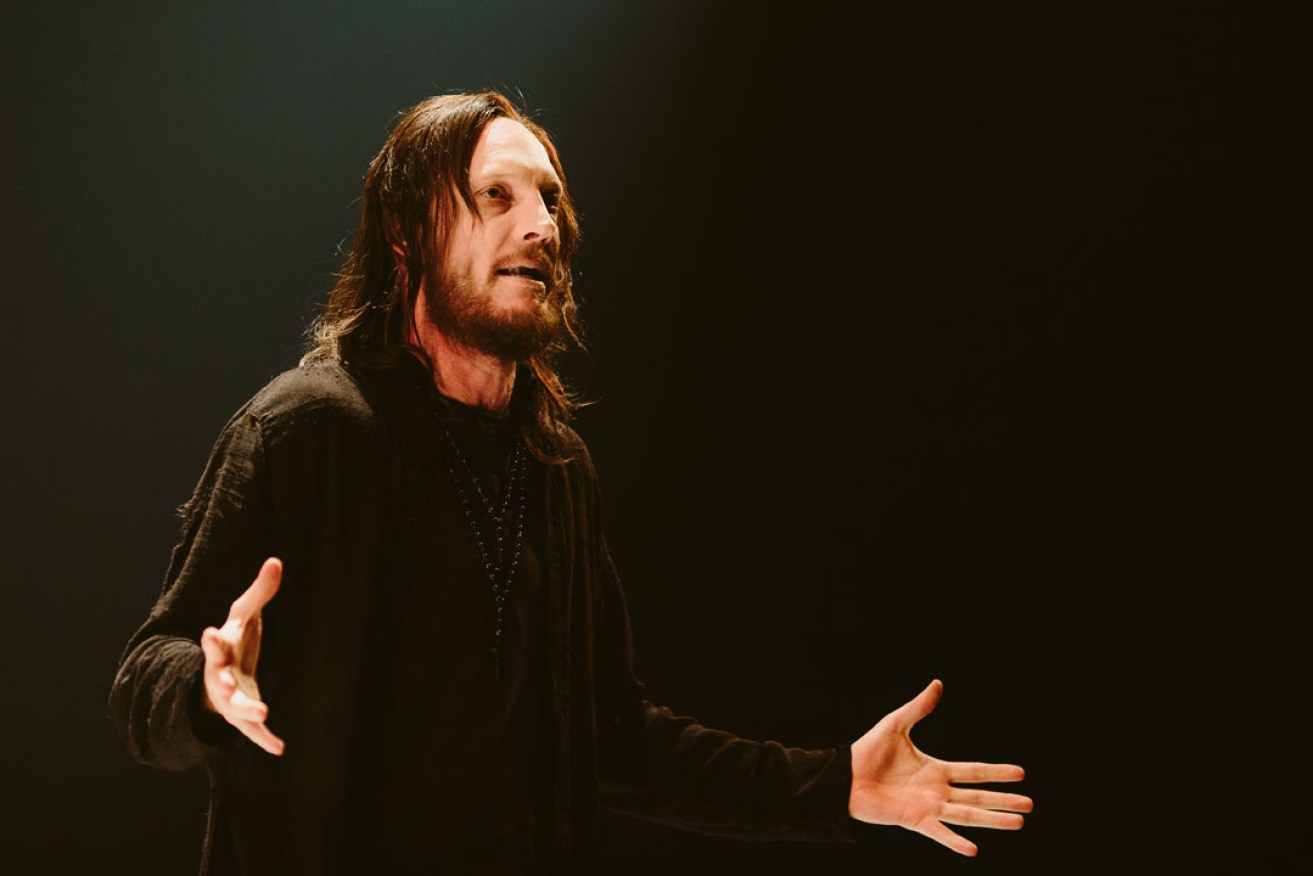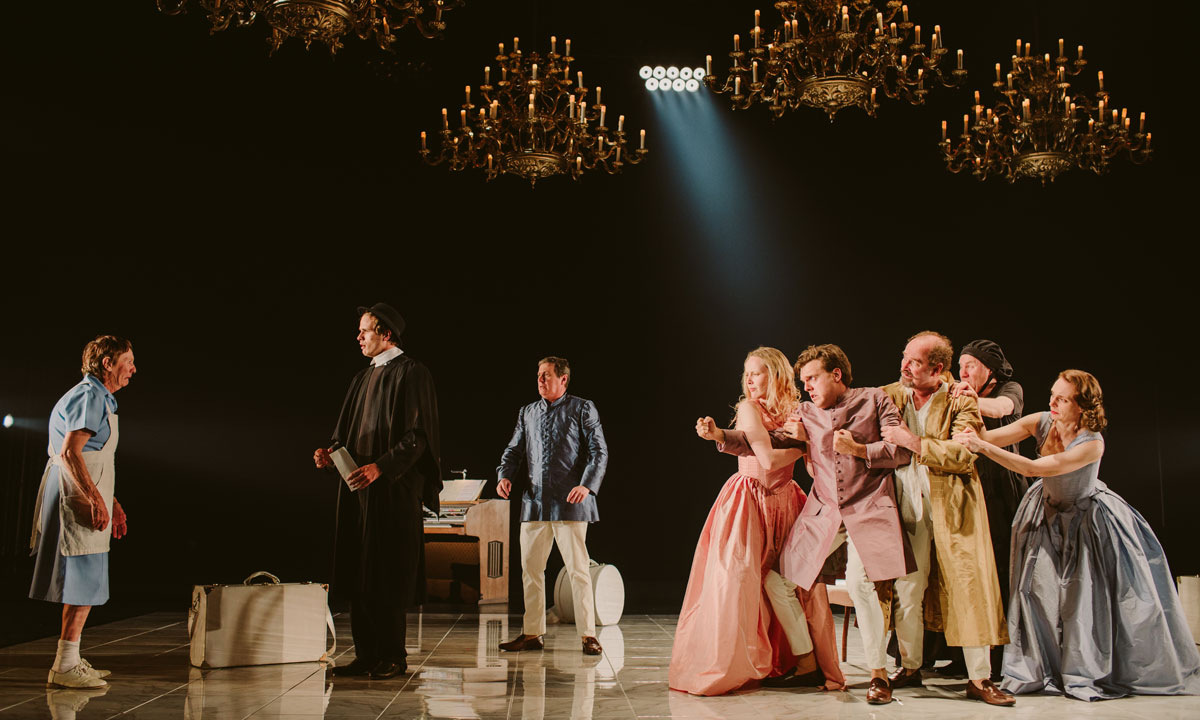Tartuffe: a timeless tale of lies, seduction and betrayal
Funny, clever and inventive, this South Australian production of Molière’s classic tale of the slick conman Tartuffe is a marvellous fusion of old and new, writes reviewer Greg Elliott.

Nathan O’Keefe gives a breath-taking performance as Tartuffe. Photo: Kate Pardey
Directed by Chris Drummond and jointly presented by the State Theatre Company of SA and Brink Productions, Tartuffe is a very fine showcase of SA talent.
Phillip Kavanagh’s brilliant adaptation of Molière’s play is a resounding success: the script is a gift for actors with its witty puns, lewd innuendo, modern references and quality satire which shifts seamlessly from light farce to serious drama in a blink.
Tartuffe is the story of a conman who deceives a nobleman, Orgon, by convincing him of his purity and godliness. Tartuffe then seduces his wife while being offered his daughter’s hand in marriage and, ultimately, has Orgon’s fortune signed over to himself.
Moliere’s play – written in 1664 – holds no punches and, in its time, it greatly offended the Catholic church.
Drummond has brought some distinctive Brink qualities to the Dunstan Playhouse, with designer Michael Hankin’s sparse setting (a floor of marble tiles, five chandeliers, an organ and darkness that extends to the extremities of the stage), a very tasteful placement of his actors and a delight in the delivery of the spoken word.
Nathan O’Keefe’s portrayal of Tartuffe is breath-taking; he charms the audience with an opening monologue, then reappears as a creepy, untrustworthy Tartuffe, dressed in modest, torn, black priestly garb. O’Keefe revels in Kavanagh’s dialogue, revolts us all with his lustful advances to Orgon’s wife, achieves moments of pity in Tartuffe’s weakness, then struts the stage with commanding dramatic authority. It’s a performance that will long be remembered.
There are picturesque images when the production re-creates iconic religious art in the crucifixion, Jesus reclining in his mother’s arms and, in a tremendous visual opening to Act Two, The Last Supper gliding towards the audience.
The text also gives prominence to Dorine, a maid who sees through the foibles, ignorance and stupidity of her upper-class masters. Jacqy Phillips’ acerbic portrayal is timed to perfection, making every line a winner.

Tartuffe: a showcase of South Australian talent. Photo: Kate Pardey
Paul Blackwell is his usual, talented self as Oregon, the foolish wealthy man who irritates the hell out of us with his inability to see how he is being swindled: the actor is comic but he, too, creates subtlety, variety and emotion. Rory Walker, as Cléante, has some beautiful lines: occasionally he offers wise, sanguine advice, while at other times he spouts clichés and platitudes … or he is just paradoxical?
Composer-musician Alan John plays live throughout the show, and he also has a cameo as Orgon’s mother, the matriarch who sets the tone of the play in the opening scene with a blunt dressing-down of all the characters.
Tartuffe provides Astrid Pill with some feisty scenes and showcases the talents of the next generation of performers: Rachel Burke as the somewhat simple Mariane, Antoine Jelk as her equally naïve lover and Guy O’Grady as the very simple son of Orgon.
Tartuffe is a classical piece of theatre, written initially in the 1660s but modernised and every bit as applicable to today: the tale of hypocrisy and deception, of fortunes rising and falling, and of con merchants deceiving others of their material gains is one that will resonate with audiences.
The State Theatre Company and Brink Productions’ show is a marvellous fusion of the old and new, offering the cast and crew a chance to display their talents. It is very funny, clever, picturesque, imaginative and inventive, but also immerses the audience in tense drama, leaving us to think about corruption, religion and what ethical code we should choose to live by.
State Theatre Company and Brink Productions are presenting Tartuffe at the Dunstan Playhouse until November 20.




